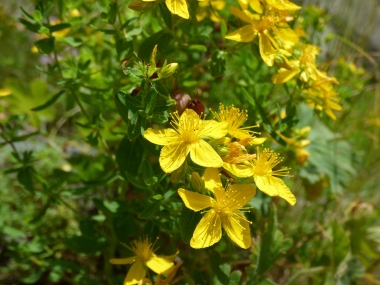Hypericum perforatum is the Latin name of St. John's wort. Also known as burns herb or devil's advocate, this perennial plant with a stiff and stiff stem gives off a warm and balsamic smell.
St. John's wort thrives in light, poor soil and full sun. One crosses it easily at the edge of the ways, in the waste lands, the clearings. One can find it until 2000 meters (2100 yards) of altitude. Its leaves are oval, thin and elongated while its flowers are yellow with secreting glands that tint the fingers red when crumpled.
How to cultivate and harvest it ?

At the time of the sowing in tub or surface, it is necessary to ensure a good luminosity for the seed. The transplanting of the seedling must be carried out with care, because it is fragile. Planting can be done in spring or fall, with only a few leaves. Sowing in the open ground is preferable in spring, to take advantage of the good luminosity for the germination of the seeds. The emergence can take time. Plants should be spaced 15 centimeters (6 inches) apart. Propagation can be done by sowing. It is important to ensure that the soil is well drained and dry. It is recommended to add compost to the plantation. Mulching with pebbles is recommended. Water requirements are low. The culture in pot is possible.
Medicinal virtues

The St. John's wort is a plant with incredible medicinal virtues :
- in particular on the psyche : great sedative antidepressant, the St John's wort is employed today in the average depressions. Stimulant of the central nervous system, it involves an increase in the activity of the serotonin and a reduction in the beta-adrenergic activity. It also stimulates the production of melatonin and is therefore of particular interest in cases of winter depression.
- with its balsamic properties, St. John's wort allows to soothe asthma, bronchitis, and inflammation of the respiratory tract.
- it has an antiviral action on viruses such as herpes, hepatitis B and flu.
- in oil form, St. John's wort is very effective on burns, sunburns and all skin inflammations. Moreover, it calms the pain and facilitates the repair of the skin.
Precautions for use
- St. John's wort is photosensitizing. You should not expose yourself to the sun when using it.
- St. John's Wort also interacts with many drugs. This interaction can be responsible for more or less dangerous side effects. The most representative example is the decrease in the effectiveness of an oral contraceptive with an increased risk of pregnancy. Other drugs are also victims of interactions with St. John's wort : antiretrovirals, digoxin, theophylline, ciclosporin, anticoagulants, immunosuppressants and serotonin reuptake inhibitor antidepressants.







